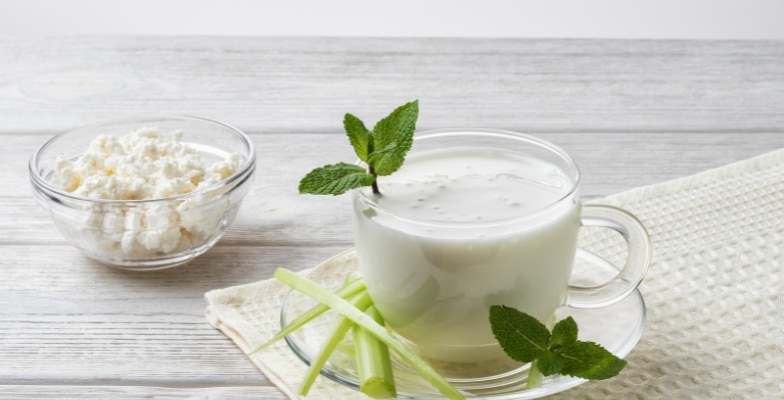Saturated Fat: Good Or Bad?
- Introduction
- What Is Saturated Fat?
- Is Saturated Fat Good for Health?
- Saturated Fat Daily Intake
- Conclusion & My Recommendation

Introduction
When saturated fat got mixed up with the high sugar added to processed food in the second half of the 20th century, it got a bad name.
-UC San Francisco pediatric endocrinologist Robert Lustig.
Why Was Saturated Fat Demonized In The First Place?
It all started with Ancel Keys and the Seven Countries Study.1https://www.sevencountriesstudy.com/about-the-study/investigators/ancel-keys/
Keys launched the Seven Countries Study in 1958 to research the relationship between dietary patterns and the prevalence of coronary heart disease. He uncovered a direct link between heart disease from high total serum cholesterol and saturated fat intake.
However, the study was seriously flawed. Keys started out with data from 22 countries and simply omitted the data from the countries that didn’t fit with his hypothesis!
For the last four decades, because of him and his deceptive study, we have been eating cereals with skimmed milk instead of whole egg omelets made in butter.
The American Heart Association recommends aiming for dietary patterns that derive 5 to 6 percent of it’s calories from saturated fat. 2https://www.heart.org/en/healthy-living/healthy-eating/eat-smart/fats/saturated-fats For a 2000-calorie-a-day diet, this equates to around 13 grams of fat (120 calories).
They state that saturated fats raise the level of cholesterol in your blood but fail to delineate which type of cholesterol they are referring to!
They go on to suggest that one should replace foods high in saturated fats with foods high in monounsaturated and or polyunsaturated fats by eating foods with liquid oils. And the best part is that they depict saturated fat with a big picture of a hamburger!
Update (14th May 2020): They have changed the image to a more relevant one now 🙂
On the contrary I feel saturated fats are protective and found in real food and not junk. Real food lives up to the principle that food should confer wellness.
A hamburger contains calories mainly trans fat and refined sugar. When you combine that with inactivity, you’ve got a real problem on your hands.
Unfortunately, it is saturated fat that shoulders the blame.
Blaming heart disease on high serum cholesterol levels is like blaming the firemen who have come to put out a fire, for starting it in the first place!
– Mary Enig, PhD, and Sally Fallon, President of The Weston A.
Unfortunately, after four decades of embracing the idea that saturated fat is bad for your heart, it will require no less than a revolution to break free of this massive misinformation, but times have started to change.
What Is Saturated Fat?
Fats and oils are made of collections of molecules called triglycerides.
If this collection is liquid at room temperature, it can be called an oil, if it’s solid, it is referred to as a fat.
A triglyceride is formed from three fatty acids attached to a glycerol molecule. Saturated fats are triglycerides that contain only single covalent bonds between fatty acid carbon atoms.

Image Source 3Chemistry.stackexchange.com
Because they lack double bonds, each carbon atom is saturated with hydrogen atoms. A few examples of these include cocoa butter, palm oil, coconut oil, and red meat.
Is Saturated Fat Good for Health?
In 2010, a meta-analysis involving more than 300,000 individuals found no significant evidence that dietary saturated fat is associated with an increased risk of coronary heart disease or cardiovascular disease. 4https://www.ncbi.nlm.nih.gov/pmc/articles/PMC2824152/
A recent British Medical Journal article by British cardiologist Aseem Malhotra5https://www.bmj.com/content/347/bmj.f6340.full, an interventional cardiology specialist registrar at Croydon University Hospital in London, states:
The mantra that saturated fat must be removed to reduce the risk of cardiovascular disease has dominated dietary advice and guidelines for almost four decades.
Yet scientific evidence shows that this advice has, paradoxically, increased our cardiovascular risks.
The aspect of dietary saturated fat that is believed to have the greatest influence on cardiovascular risk is elevated concentrations of low density lipoprotein (LDL) cholesterol.
Yet the reduction in LDL cholesterol from reducing saturated fat intake seems to be specific to large, buoyant (type A) LDL particles, when in fact it is the small, dense (type B) particles (responsive to carbohydrate intake) that are implicated in cardiovascular disease.
Indeed, recent prospective cohort studies have not supported any significant association between saturated fat intake and cardiovascular risk Instead, saturated fat has been found to be protective.
A meta-analysis of observational studies and 27 randomized, controlled trials published in the Annals of Internal Medicine also concludes that current evidence does not clearly support cardiovascular guidelines that encourage high consumption of polyunsaturated fatty acids and low consumption of total saturated fats. 6https://www.acpjournals.org/doi/10.7326/M13-1788?articleid=1846638&
This particular analysis included data from more than 600,000 people in 18 countries. Nature cannot be wrong.
Did you know that mother’s milk has more than 50 percent of calories from saturated fat and a higher proportion of cholesterol? 7https://www.ncbi.nlm.nih.gov/pmc/articles/PMC2950926/, 8https://www.westonaprice.org/health-topics/childrens-health/fat-and-cholesterol-in-human-milk/
This is because cholesterol and saturated fat are essential for growth in babies and children, especially when it comes to brain development. The benefits of saturated fats clearly illustrate their importance.
Saturated fats are very stable and do not oxidize when used in cooking at high temperatures. However, the oils most of us tend to use are polyunsaturated (canola, soy, corn, safflower, and sunflower). These do oxidize when they are used for high heat cooking, creating harmful free radicals in the process.
Saturated fats play many vital roles in the body, such as helping to strengthen the immune system, promote healthy bones, protect the liver, and provide structural integrity to the cells.
After all, saturated fatty acids make up at least half of your cell membranes.
Moreover, short- and medium-chain fatty acids inherent in saturated fats like coconut oils have important antimicrobial properties.
Saturated Fat Daily Intake
As of 2010, the U.S. Department of Agriculture’s (USDA) dietary guidelines call for reducing your saturated fat intake to a mere 10 percent of total calories, which I believe is very low if you want to maintain optimal health.
My diet is routinely 30 to 40 percent fat, and saturated fat constitutes a significant portion of it. I don’t remove my egg yolks.
Related Article: Is Egg Good For Health? | How Many Eggs Can I Eat In A Day?
I drink whole milk, and I cook in desi ghee. (besides coconut oil), I eat significant amount of nuts, including almonds and walnuts. In addition, I take around 1mg of krill oil with my breakfast.
I get around 30 percent of my calories from protein, and the rest comes from carbs. I have been very consistent with this diet for the past few years now.
Conclusion & My Recommendation
Dietary solutions need to be tailored to individuals because what works for one person may have no effect on another person, and may make the third person worse.
~William Wolcott
I am not asking you to start eating 40 percent of your calories from fat. Instead, the main objective of this article is to suggest that saturated fat is important for the human body to function properly and should not be neglected.
How much dietary fat one should consume depends upon your type.
Dr. Joseph Mercola has done a wonderful job at figuring out this genetic variation and has developed a set of questionnaires designed to determine a person’s nutritional type.
The results classify people as one of three types: carb type, protein type, or mixed type. Carb types feel best when most of their food is healthy carbohydrates, whereas protein types operate best on a low carbohydrate, high protein, relatively high fat diet.
Mixed types require food combinations somewhere in between the carb and protein type groups.
Dr. Mercola’s questionnaire is a free test that anyone can take to figure out what type he or she is and accordingly the kind of diet needed to experience optimal health. Try it. It doesn’t take long. Be sure to watch the video first. 9https://products.mercola.com/nutritional-typing/
In the end, no matter what type you are, saturated fat plays an important role in your diet, and most people should include more sources of healthy fats in their diets.
What do you think about saturated fats? Have any questions, let me know in the comments below!

Skill-Based Education.
Global Recognition.
Powerful Community Building
Secure a certificate of completion in as little as a day by graduating from one of our free courses.
Get Access to Our Free Courses. No Credit Card Required.

Fabulous Body Membership
Your All-Access Pass to A Fabulous Body & A Rewarding Career
25+ Certificate Courses & Programs, All Included
15 Day Free Trial, 100% Money-Back Guarantee
About Akash Sehrawat
Akash is a creator of 25+ programs and certificate courses in which more than 200,000 students have enrolled both on Udemy and Fabulous Body's native platform. Akash is also an author of three books that can be found on Amazon. His answers on Quora have gathered more than 12 million views in less than a year.











Nice course learned more new lesson
Thanks!
If saturated fat plays an important role in diet, there is also increase risk of cardiovascular disease, so what is the proper way to choose these.
Thanks
Thanks sir i was confused but now i m clear ..
Hi Akash, I understood that Saturated Fats are healthier than Unsaturated Fats. I found some contradicting theory on http://www.heartuk.org.uk website, which says “too much saturated fats will raise your blood cholesterol, while unsaturated fats are more heart-healthy”. Below is link:
https://www.heartuk.org.uk/low-cholesterol-foods/fats-and-oils
Unsaturated fats are found in Seeds & Nuts, Olive Oil, Walnut, Sunflower Oil, Salmon Fish, Avocado etc. which are healthy, according to above website.
Can you throw some light on it?
Thanks.
I’m fully enjoying the mix of information, reading, clear links, your video structure to support my learning. All up to date, accessible….its a real boost to use my brain…..alongside my passion for health and food. Appreciate the high quality. Thank you
Hi Adrianne,
Good to know that you liked the article!
We put a lot of effort into bringing together this knowledge with solid studies to back them up!
Wish you good health!
Regards,
Kunal,
Team Fabulous Body
Hi Nikhil,
Both saturated and unsaturated fats are good for us when consumed in the right form and balance.
Here is an article to throw more light on the subject:
https://fabulousbody.com/fat-the-ultimate-guide-to-the-most-misunderstood-macronutrient/
Regards,
Kunal,
Team Fabulous Body